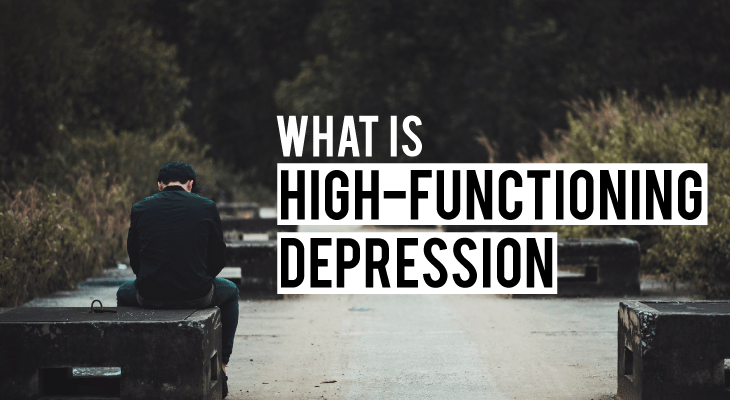High-Functioning Depression: What Is It?
Depression has many faces, and high-functioning depression is a new form of mental illness plaguing the world. In our article, we shed some light on what it is and how you can manage it better.
Updated 08 May 2019

Have you ever had a good night out with friends filled with inside jokes and lots of laughter, yet your mood takes a downward spiral the instant you get home? Do you seem to have it all with a great bunch of friends and a string of As to boot, but wake up each morning with a gripping sense of fear and anxiety?
You might not think it, but you could be experiencing high-functioning depression.
Depression? Isn’t that for sad people who can’t stop crying and refuse to get out of bed? This can’t possibly be depression. Or can it?
In this article, we shed light on high-functioning depression, a type of depression that doesn’t quite fit the stereotypical always-crying-can’t-get-out-of-bed depression.
It’s sometimes known as smiling depression

High-functioning depression, or what is clinically known as dysthymia, is a condition where you are in a “depressed mood for most of the day, for more days than not, for at least 2 years”.
While this may seem similar to symptoms of normal depression, those dealing with high-functioning depression may not have the same severe levels of diminished function, both from a physical and mental perspective.
In order words, people with high-functioning depression often don’t “look depressed”. They’re likely to be employed, accomplished (e.g. CEOs, managers, etc.), educated, in a romantic relationship and with social lives that seem perfect from the outside. However, this doesn’t represent how they feel inside, where they may be gripping with symptoms of depression; hence, the term smiling depression.
There are no outward symptoms

High-functioning depression has symptoms that can be hard to spot, as from the outside, there shouldn’t be any reason to be depressed. This means that those going through it are often unaware that they have it, or if they are aware, they don’t seek help at all.
Psychotherapist Mayra Mendez states that although depression usually makes people feel like doing nothing the whole day, it doesn’t affect high-functioning individuals who tend to be more headstrong in order to succeed in their goals. These individuals have learnt to separate their feelings of depression so that they can get things done.
In fact, some people who have high-functioning depression may seem to be more productive than those without. Take Tom Wootton, for example. Although he is going through high-functioning depression, he is still focused and gets projects completed on time.
Symptoms of high-functioning depression

While you may not be able to recognise high-functioning depression immediately, there are some signs that you can look out for.

#1. You are always hard on yourself
Does the phrase “you are your own worst critic” sound familiar to you?
You may have high-functioning depression if you are especially prone to criticising yourself and always doubt your abilities no matter how much you succeed.
When this happens, you are especially critical of yourself when you feel like you’re not achieving much or when you don’t see instant results after completing projects. This is because your expectations are exceedingly high, leading you to push yourself to achieve unrealistic goals.
#2. You turn to coping mechanisms frequently
Turning to coping strategies, whether it’s substances (e.g. alcohol, drugs) or behaviours (e.g. excessive gaming, constant Netflix binge-watching) as a once-in-a-while stress reliever may seem normal for everyday people.
However, if you are increasingly turning to such mechanisms every time you need to deal with tough situations as an effort to escape your life, this could be an underlying depression.
You may even find yourself making excuses to justify this newfound behaviour: “It’s been a stressful day in university”, “My lecturers were being extra picky towards me today”, “My group mates are so useless that I have to destress”.
Apply for university with EduAdvisor
Secure scholarships and more when you apply to any of our 100+ partner universities.
Start now#3. You generally feel sad without knowing why
Behind the mask of productivity and competency, do you find yourself often feeling sad, numb or a sense of hopelessness without knowing why?
Although it is normal to feel sad every so often, people who suffer from high-functioning depression find it hard to experience happiness and joy, even when doing things they used to love. Despite being able to keep it all together — crossing off to-dos, achieving goals, completing assignments — secretly, they are experiencing turmoil and sadness inside.
#4. You feel easily irritated
People with high-functioning depression may also find themselves being more irritable than normal, especially over little things. They may blow up unexpectedly and disproportionately when a friend cancels on them at the last minute, a groupmate messes up the margins of an assignment or a lecturer picks on them during class.
So if you find yourself constantly exploding over small things instead of viewing it as a mild annoyance that it is, this could be an indicator of high-functioning depression.
Hard to identify, harder to treat

Because of the lack of acknowledgement towards the symptoms mentioned above, sufferers tend to brush off their feelings and go about their lives. But this gets in the way of them seeking treatment or support from others. In addition, the depression continues to build and adds to their negative self-image.
Managing high-functioning depression

Just like other mental illnesses, the best way to treat high-functioning depression is to seek professional help. With mental illness on the rise in Malaysia, you should always reach out to your university’s counselling centre, or any of these counselling services.
When it comes to mental health, it’s important that you speak freely and openly about your issues and request for professional evaluation. Depending on the severity of your illness, psychiatrists would recommend medication or psychotherapy.
On the other hand, if you are strapped for money, there are other ways you can manage your depression:
- Acknowledge and be aware that you are actually going through depression
- Confide in your most trusted friends and build a foundation of support with them
- Participate in small group activities to avoid isolating yourself
- Spend more time outdoors in the fresh air and sunshine
- Avoid staying up late in the night and establish regular sleeping patterns
Having a positive mindset while going through depression can be a challenge, but with the right treatment, you can combat it!

Supporting a friend going through high-functioning depression

Not knowing what to say or how to act around friends going through depression can be tricky. However, here are some tips you can apply to help them through their ordeal:
- Listen to their problems, be their shoulder to cry on and offer words of encouragement
- Persuade them to seek professional help and offer to sit through it with them
- Help them maintain a regular routine of sleep, meals and social activities
- Spend some time with them, no matter how busy you are
- Avoid discouraging statements that will cause them to spiral back into depression
It takes a lot of patience and perseverance to help a friend manage their mental health — you can expect them to shirk away from any form of help, so be persistent yet gentle.
Depression is a medical condition caused by a chemical, biological and structural imbalance that affects mood regulation. It’s not easy to identify and you can’t just snap out of it quickly. However, know it’s not always a dark cloud looming over you — if you are suffering from depression, there are ways to treat it. The road to recovery isn’t a race; it’s a journey.






